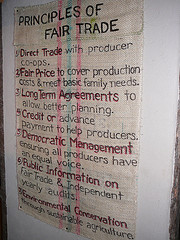Grandmother and former nurse Linda Sones sells organic cotton baby and children’s clothing and accessories, and natural, organic baby toiletries online at SonesUK. Her suppliers are all committed to various environmental and Fairtrade initiatives.
 Fairtrade is an organized social movement and market based model of International Trade (Wikipedia). In a capitalist society profits rule and the scramble of wealthy countries to make money often results in exploitation of small scale producers such as farmers, craft and textile workers etc. who are left to exist on minimum wages without any hope for their and their families’ future. At present the rules of global economics are made by institutions such as the World Trade Organisation, the World Bank and the International Monetary Fund. Global policies are developed with input mainly from multinational corporations and little input from the public.
Fairtrade is an organized social movement and market based model of International Trade (Wikipedia). In a capitalist society profits rule and the scramble of wealthy countries to make money often results in exploitation of small scale producers such as farmers, craft and textile workers etc. who are left to exist on minimum wages without any hope for their and their families’ future. At present the rules of global economics are made by institutions such as the World Trade Organisation, the World Bank and the International Monetary Fund. Global policies are developed with input mainly from multinational corporations and little input from the public.
Fairtrade works by paying producers a fair price for crops plus a little extra to help community development projects. It also helps to promote social and environmental standards. Price is agreed according to local or regional context, is reached via discussion with all parties and covers not only the cost of production but enables socially just and environmentally sound production. It pays fairly and without gender bias so that women are properly rewarded for their work. It is suggested that many more farmers could benefit from Fairtrade if it were not for unfair trade rules that make it very difficult for poor countries to trade their way out of the poverty trap. For example tariffs which are a type of import tax are levied by many countries. A tariff of 500 percent on rice for example makes it impossible for poor countries to trade with Japan. The European Union and United States of America give farmers massive subsidies. Resultant over production is then ‘dumped’ on poor countries making it difficult for farmers to even sell their crops within their own country.
Read More »What’s so important about Fairtrade?
 Fairtrade is an organized social movement and market based model of International Trade (Wikipedia). In a capitalist society profits rule and the scramble of wealthy countries to make money often results in exploitation of small scale producers such as farmers, craft and textile workers etc. who are left to exist on minimum wages without any hope for their and their families’ future. At present the rules of global economics are made by institutions such as the World Trade Organisation, the World Bank and the International Monetary Fund. Global policies are developed with input mainly from multinational corporations and little input from the public.
Fairtrade is an organized social movement and market based model of International Trade (Wikipedia). In a capitalist society profits rule and the scramble of wealthy countries to make money often results in exploitation of small scale producers such as farmers, craft and textile workers etc. who are left to exist on minimum wages without any hope for their and their families’ future. At present the rules of global economics are made by institutions such as the World Trade Organisation, the World Bank and the International Monetary Fund. Global policies are developed with input mainly from multinational corporations and little input from the public.